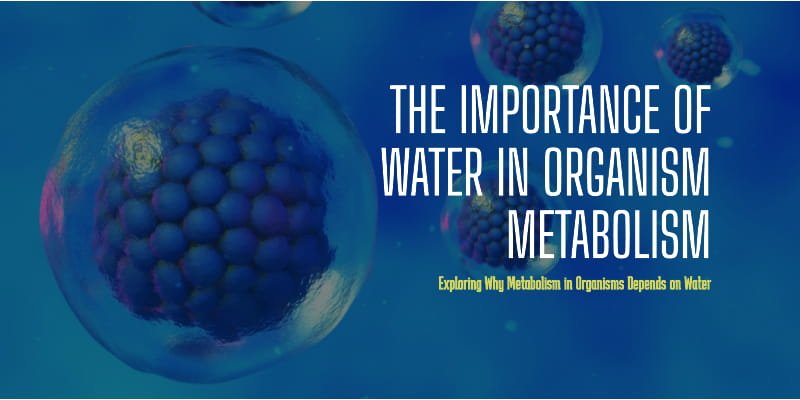Water is essential for life, but why is it so important for metabolism? Metabolism is the sum of all the chemical reactions that take place in an organism to maintain its vital functions, such as growth, repair, movement, and energy production. This article will explain why metabolism in organisms depends on water.
Metabolism is a fundamental process in all living organisms, from the tiniest microbes to complex multicellular creatures like humans. It encompasses all the chemical reactions that occur within an organism to maintain life. But have you ever wondered why metabolism in organisms depends on water? In this comprehensive exploration, we will delve into the essential role that water plays in metabolic processes and why it’s a critical component for life itself.
Water plays a crucial role in metabolism in several ways:
Water as a solvent
Water is the most abundant and universal solvent in nature. It can dissolve and transport many substances, such as sugars, salts, amino acids, vitamins, minerals, and hormones. These substances are the building blocks and regulators of metabolism. They need to be dissolved in water to be absorbed, distributed, and utilized by the cells. Water also helps to remove waste products from the cells and the body through urine, sweat, and breath.
Water as a reactant
Water is not only a solvent, but also a reactant in many metabolic reactions. For example, water is involved in the breakdown of carbohydrates, fats, and proteins into smaller units that can be used for energy or other purposes. This process is called hydrolysis and it requires water as a source of hydrogen and oxygen atoms. Water is also involved in the synthesis of larger molecules from smaller ones, such as the formation of proteins from amino acids or DNA from nucleotides. This process is called dehydration synthesis and it produces water as a by-product.
Water as a temperature regulator
Maintaining the right temperature is crucial for metabolic reactions. Water has a high specific heat capacity, meaning it can absorb and release a significant amount of heat without undergoing drastic temperature changes itself. This property helps regulate the temperature within organisms, ensuring that metabolic processes can proceed optimally. Without water’s temperature-regulating abilities, extreme temperature fluctuations could disrupt these reactions.
Water as a lubricant and cushion
Water has a low viscosity, which means it can flow easily and reduce friction between moving parts. This property makes water an effective lubricant for joints, eyes, mouth, and other organs that need to move smoothly. Water also acts as a cushion for organs that are subject to pressure or shock, such as the brain, spinal cord, heart, and lungs. Water fills the spaces between the cells and tissues and protects them from damage.
Transport Medium
In multicellular organisms, water plays a pivotal role in transporting nutrients and waste products. Metabolic reactions often produce waste substances that need to be eliminated from the body. Water, in the form of blood and other bodily fluids, acts as a carrier, facilitating the transport of these waste products to excretory organs for disposal. Simultaneously, it transports essential nutrients to cells, where they are used for energy production and other metabolic functions.
Hydrolysis and Dehydration Synthesis:
Two fundamental metabolic processes, hydrolysis and dehydration synthesis, rely heavily on water. Hydrolysis involves the breakdown of complex molecules into simpler ones by adding water molecules. Conversely, dehydration synthesis is the process of building complex molecules by removing water molecules. These processes are essential for breaking down nutrients for energy and building essential biomolecules like proteins, nucleic acids, and carbohydrates.
Consequences of Water Scarcity in Organisms
Understanding the dependency of metabolism on water sheds light on the dire consequences of water scarcity for living organisms. When there isn’t enough water available, metabolic processes can slow down or even cease. Cells may struggle to transport nutrients and eliminate waste, leading to a host of health problems. Additionally, extreme dehydration can be life-threatening, as it disrupts the delicate balance required for metabolic reactions.
The Importance of Staying Hydrated
Now that we’ve established how vital water is for metabolism, it’s crucial to emphasize the importance of staying hydrated. Proper hydration ensures that there’s enough water in the body to support all metabolic processes. Without adequate hydration, you may experience a decrease in energy levels, impaired cognitive function, and even compromised immune function.
Drinking water regularly is the simplest way to maintain proper hydration. While individual water needs vary, a general guideline is to aim for at least eight glasses (64 ounces) of water per day. However, factors such as climate, activity level, and overall health can influence your specific hydration requirements. Listen to your body; if you’re thirsty, it’s a clear sign that you need to drink more water.
Water’s Role in Digestion and Nutrient Absorption
Water is not only essential for metabolic reactions within cells but also plays a crucial role in the digestive system. Digestion involves the breakdown of food into smaller molecules that can be absorbed and used by the body. Water is required for the dissolution of nutrients, making them accessible for absorption in the intestines. Without an adequate water supply, the digestive process can be impaired, leading to nutrient deficiencies and other health issues.
In conclusion, water isn’t just a beverage we consume; it’s a life-sustaining elixir that fuels metabolic processes, regulates temperature, and aids in digestion. The keyword repetition, “Explain why metabolism in organisms depends on water,” underscores the importance of water in every aspect of life, from the microscopic reactions inside our cells to the overall well-being of complex organisms. So, remember to stay hydrated and appreciate the incredible role that water plays in keeping us alive and thriving.
As you can see, water is vital for metabolism in organisms because it facilitates many chemical reactions, transports nutrients and wastes, regulates temperature, and provides lubrication and protection. Without water, metabolism would slow down or stop altogether, leading to dehydration, malnutrition, overheating, or organ failure. Therefore, it is important to drink enough water every day to support your metabolism and health.







